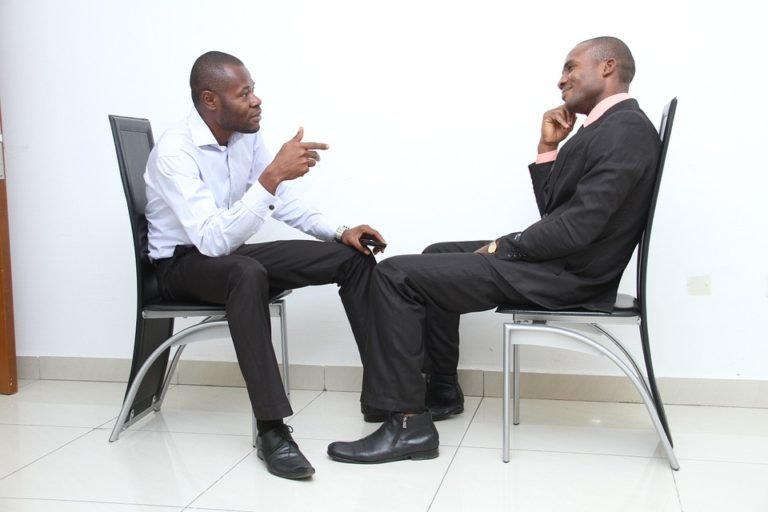My Final Interview

The final interview, which is where hiring decisions are made, took place four days later. HR told me there would be two people at the interview: the two people to whom I would report.
This position had a dual-reporting relationship: one to the Chief Information Officer, and one to the Director of the specific organization in which I would work, so I had to impress two bosses. Well, it doesn’t get any more stressful than that!
As I stood outside the room where the interview would take place, I heard voices and laughter from the inside. A few minutes later, a man walked out dressed just like me (that is, in a conservative suit and tie) and gave me a sideways glance as he walked by.
I correctly surmised that he was another one of the finalists who just had his interview. Based on the jovial mood that I heard coming from the room, I suspected that his interview went very well. It looked like I’d have a tough act to follow.
I went in, was introduced to my two potential bosses – one man and one woman. Neither of them smiled as they introduced themselves and I thought to myself that it looked like I had my work cut out for me. And I was right.
They started asking a few questions slowly and seemed to be struggling for things to say. It seemed they were rapidly losing interest in the interview and I could see this job offer flying away as I sat there. What happened to that jovial mood that the previous candidate seemed to enjoy? Was I really blowing the interview that badly?
Since they weren’t talking much, I decided to take a more active role. As I did in the initial interview, each time they asked a question I answered it in terms of things specific to their organization.
I talked about my previous jobs but always finished with a statement something to the effect of “and this experience is similar to the situation you faced” and I would name a relevant fact or circumstance that I had read in my research.
Since my advance preparation was very thorough, I was able to answer most questions with a comment about something similar that they had faced.
After about the fourth or fifth time that I specifically mentioned one of their organizational objectives or projects, they were both nodding their heads as I spoke and seemed pleased and somewhat surprised that I knew so much about their organization.
What I believe really sealed the deal for me was this. When I was answering one of the questions, I specifically mentioned that my background was originally in business, not information technology. Now, since the job I was interviewing for was an IT manager position, this would appear to be a high risk maneuver.
BUT…I had really done my homework. I knew from my research that the CIO’s background was also in business, before he transitioned over to the IT side of the house. That’s why I made sure to work into the interview the fact that my background was originally in business (which it was).
As soon as I said that, the CIO perked up and said, “You know, my background is also in business and I’ve always thought it made me a better CIO.” From that point on, the interview went very smoothly and I could seem to do no wrong with my answers.
That’s the power of good interview preparation.
At the end of the interview, I once again asked three or four very pointed questions about their organization’s goals and objectives, from the list I prepared in advance.
However, even after my coup with the “business background” comment, neither of them smiled once the entire time and I left the interview truly not knowing how I’d done, for the first time in my career. All in all, an unusual experience for a Hiring Manager!
The next morning, HR called and offered me the job, at a salary higher than I expected. Apparently my research and knowledge about the company (and, I have to believe, my “business background” comment) had saved the day.
Next time, I’ll review the lessons I learned from my interview experience. Lessons that will perhaps help you in your next interview.





